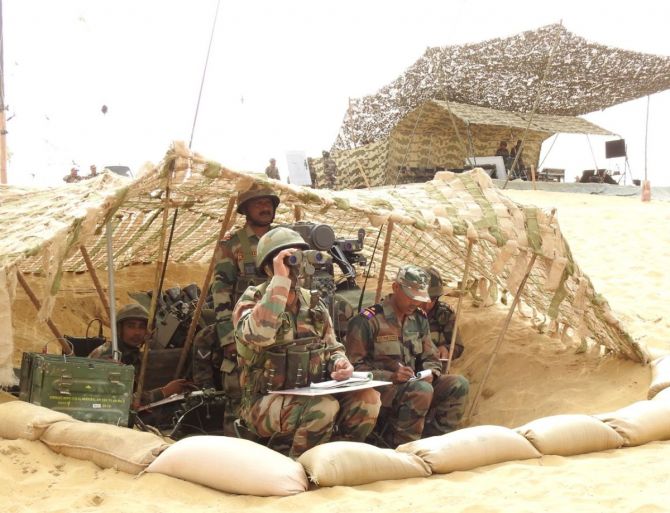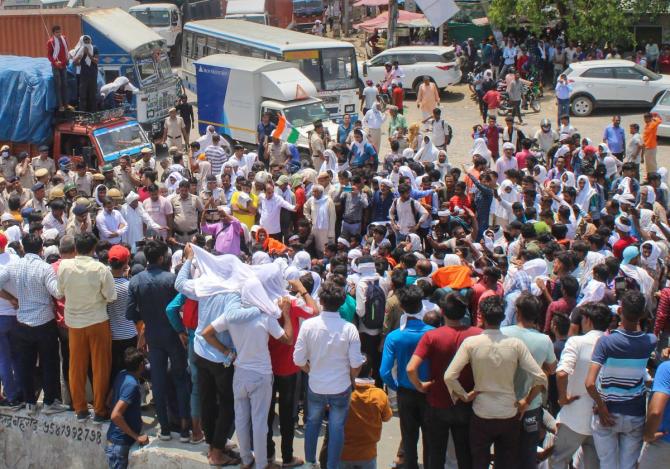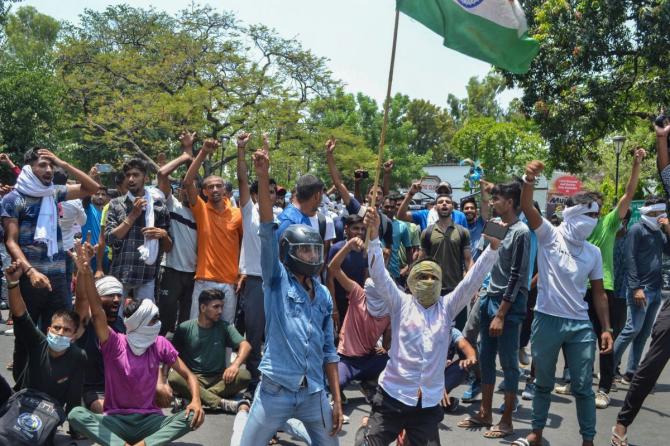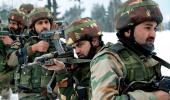Agnipath may be an exercise to address the genuine needs of the armed forces.
But overall, it betrays the tendency to use the military and paramilitary for employment generation and shaping a national character, instead of treating them as the professional services they are, notes Shyam G Menon.

Given their affection for martial imagination, organisations like the RSS and BJP would be well aware of what the soldier has traditionally meant in human history.
They are also equally aware of how the fighting man has come to be supported by society in modern times.
He enjoys good salary, subsidised food and shelter, medical benefits for self and family and pension. It is a valued paradigm of employment.
Following economic liberalisation, young Indians began experimenting with other models. They took their chances.
Now, battered by multiple insecurities, the greatest attraction in employment is job security.
Government jobs have become prized again and within that, military service.
Shaped by fire
In an arrangement claimed to progressively lower the average age of India's military personnel and also perhaps reduce the burden of sustaining retirement benefits and pensions, the government announced the Agnipath scheme for recruitment to the military, on June 14, 2022.
'It will provide an opportunity to the youth who may be keen to don the uniform by attracting young talent from the society who are more in tune with contemporary technological trends and plough back skilled, disciplined and motivated manpower into the society.
'As for the Armed Forces, it will enhance the youthful profile of the Armed Forces and provide a fresh lease of 'Josh' and 'Jazba' whilst at the same time bring about a transformational shift towards a more tech savvy Armed Forces -- which is indeed the need of the hour,' the official statement available on the Press Information Bureau Web site, said.
It added, 'The dividends of a short military service to the nation, society and the youth of the nation are immense.
'This includes inculcation of patriotism, team work, enhancement of physical fitness, ingrained loyalty for the country and availability of trained personnel to boost national security in times of external threats, internal threats and natural disasters."
Agnipath sparked protests and violent incidents for how it distanced contemporary youth from secure employment.
But both government and youth need to pause and reflect.
While the announcement of June was new, the idea wasn't.
Partly due to concerns for national security, partly due to our wish for discipline in a society rendered disorderly by our own conduct and more due to our society's underlying patriarchy, from years ago itself, military service of limited tenure (even compulsory) had featured in conversations around the family dining table.
It, however, stopped short of becoming stated political agenda because we knew India already had one of the world's biggest militaries and increased exposure to the military life, while probably good for discipline, also risked coloring society more and more in shades of military imagination.
That is not what we signed up for when we embraced modernity and democracy.
But in 1947, we didn't anticipate the magnitude of the instincts India subsequently showed, including our fascist urges.
The military is a vast establishment. Contemporary social engineering and politics (plus trends in media technology), value indulgence of the specific.
The silo inhabited by the soldier hasn't been spared.
Done so, the military which is identified with national security and patriotism, has become a constituency that is often spared critical perspective.
Such a predicament renders the military susceptible to hagiography and exploitation by mischievous politics without it seeming to be exploitation.
Against this backdrop, one understands why and at the same time asks why -- a scheme like Agnipath goes by that name and why those enlisting, are called Agniveers.
Once it was plain bharti (recruitment; and it saw us through several wars); now it is the stuff of agni.
How is a path fiery when it is recruitment ahead of test (if any)? Not to mention, how is everyone recruited, a hero (veer) without a battle for proof? That too, with tenure of service restricted to four years for 75 per cent of those recruited.
This is the dilution of credibility that Right-Wing imagination and its zest for heroism, discipline and a life in arms, does.
Agnipath may be an exercise to address the genuine needs of the armed forces.
But overall, it betrays the tendency to use the military and paramilitary for employment generation and shaping a national character, instead of treating them as the professional services they are.
What's more, it increases the overall number of people tasting a state of military regimentation.
When service-tenure shrinks as in Agnipath's case, those empathetic to military mentality may rise in tune with the increased throughput and turnover of soldiers.
This is welcome for the Right-Wing, which equates military with discipline, finds beauty in regimentation and has already marketed the Agnipath scheme as capable of building a disciplined workforce when deployed post-military tenure in various avenues, including at companies.

Giant finishing-school
Neither the cited virtues of Agnipath nor India's need for them can be dismissed.
But at a generic level, one does not hear of undisputable proof equating military service with fantastic workforces at companies.
For example -- what do you attribute German workmanship to; the excellence fostered within Germany's industrial guilds or the fact that in the nineteenth and twentieth centuries the country elected to grow powerful militarily?
Or take Silicon Valley; some of its leading protagonists were clearly outliers, misfits in the regular education system of our structured world.
Further, only somebody willing to be blind would overlook how an excess of the military mindset led some countries including Germany into error and disaster in the past; how some countries continue to tread the edge of such potential pitfalls in the present.
As any professional would tell, the best of professions says yes to critical perspective and don't shun questioning and introspection.
And as life teaches us, it takes a basket of diverse human pursuits to sustain our existence as a community; not one service or perspective glorified above all else.
If the military embraced this approach, if it viewed itself as one of many prospective professions around without allowing itself to loom as a major social influence or job creator, does it shoot itself in the foot or does it grow its stature?
There is also another angle. On June 20, as expected, the media reported some CEOs of India Inc expressing support for Agnipath.
They liked the prospect of a workforce, disciplined by military tenure, that either they or the government could skill/reskill as required.
Aside from the obvious fact that some of the CEOs gushing praise do business with the government and the military (and therefore their comments should be kept at arm's length), there are two aspects overlooked in this flush of eagerness.
First, by expecting the military to instill discipline, self-reliance, teamwork and such to legions of young people, we are reducing the security forces to being a nanny/tutor at large.
Left unsaid is how it reveals the shortfalls of Indian family and education.
We are essentially asking the military to bring about a self-reliance and maturity in the ward along with the capacity to coexist and work with others, that we don't teach otherwise.
We are using the military like a giant finishing school for adulthood.
Second, when we add such roles to the military, we enhance scope for the military to be larger in public life than what it is now.
Co-opted into employment generation and fostering employability, the military's influence in that sphere overlapping civilian life, may increase.
From being central to military service, the military acquires relevance in employment in general.
Not just that -- as we legitimise Agnipath as a means to secure employment post-military service, courtesy the military's ability to skill/re-skill or arrangements made for the same, the question arises: If it's all about making India Inc happy, then what does the four years of military service under the scheme promise by way of focused relevance to the military?
Aren't we better off running specially designed, affordable training schools for a new industrial workforce?

An old-school faith in outsourced guidance (being told what is best for you) and fascination for ideal men and women, are what linger as the aftertaste of India's Right-Wing.
We are demonstrating a willingness to stand enthralled by directive and regimentation, have it over-shadow other human qualities.
The Right-Wing has also shown the willingness to nudge proceedings -- political and social -- towards insecurity so that the architecture of regimentation it espouses, then becomes relevant as natural panacea, even sole panacea.
There is thus nothing surprising in Agnipath's debut either as a solution for the problems of the military or as an adjunct to generating employment and bringing discipline to the workforce.
On June 19, a senior BJP leader was reported in the media as saying the party would give preference to Agniveers when addressing its need for security.
What an outcome in the name of recruitment for one of the most respected militaries around.
Shyam G Menon is a Mumbai-based columnist.
Feature Presentation: Aslam Hunani/Rediff.com










